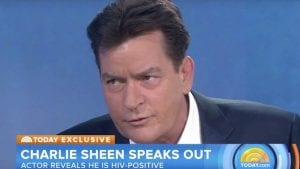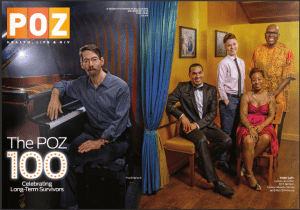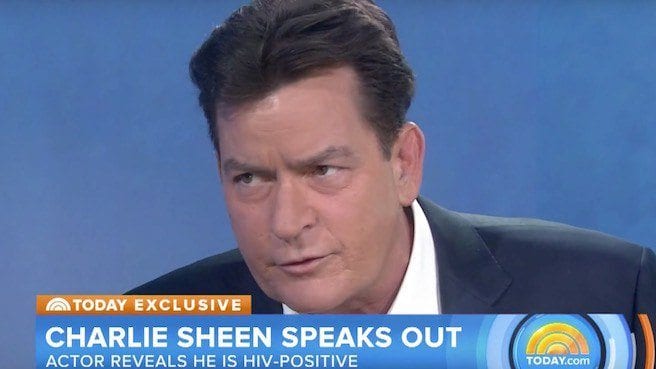By Perry N. Halkitis, Ph.D., M.S., M.P.H.
Charlie Sheen’s announcement about his HIV status illuminates quite clearly the ignorance and stigma that continues to surround the HIV epidemic some 30 years after its initial diagnosis in the United States. And it is this ignorance and misinformation that perpetuate the stigma and discrimination associated with the disease.
Despite our efforts to fight this virus in terms of treatment, education, policy, and programs seeking to protect and improve the lives of those living with HIV as well as protect those who are uninfected from acquiring the virus, the truth is that HIV continues to be a disease that is misunderstood. This misunderstanding engenders a stigma that serves solely to burden the lives of infected individuals and to perpetuate the epidemic in our country and around the world. I can only imagine the collective gasp of many within our population upon hearing Sheen’s announcement—a gasp that is rooted in this very ignorance and stigma that too often is associated with HIV.
Charlie Sheen, Ignorance, Stigma, and HIV
 Sheen’s announcement comes in close proximity to World AIDS Day on December 1st and a day after the release of Poz magazine’s latest issue celebrating the lives of 100 amazing HIV-positive, long-term survivors. These survivors have defied all odds and managed to live their lives for years with dignity while surviving and thriving with the virus—depicting amazing resilience and putting beautiful faces on the story of HIV. These commemorations are the antithesis to the many reactions to Sheen’s announcement including the shameful front page story of the National Enquirer which was highlighted by a headline referring to Sheen’s “AIDS Cover-Up” and “How He Hid the Deadly Virus for 4 Years.”
Sheen’s announcement comes in close proximity to World AIDS Day on December 1st and a day after the release of Poz magazine’s latest issue celebrating the lives of 100 amazing HIV-positive, long-term survivors. These survivors have defied all odds and managed to live their lives for years with dignity while surviving and thriving with the virus—depicting amazing resilience and putting beautiful faces on the story of HIV. These commemorations are the antithesis to the many reactions to Sheen’s announcement including the shameful front page story of the National Enquirer which was highlighted by a headline referring to Sheen’s “AIDS Cover-Up” and “How He Hid the Deadly Virus for 4 Years.”
Such sensationalist portrayals and misleading characterizations help no one—those infected and those at risk—but provide all of us dedicated to fighting this disease with an opportunity to set record straight about the current state of HIV. Here are some truths:
The HIV/AIDS epidemic is very much disease that continues to affect our population.
Each year some 40,000-50,0000 people in the United States become newly infected with the virus and 1.2 million Americans currently live with the HIV. The virus crosses all demographic boundaries and affects people of all races and ethnicities, gay and straight alike, in all age groups and economic classes, and across the spectrum of gender. Sheen is an affluent straight white male. While he may be in the minority of those infected with the virus in terms of his economic class, sexual orientation, and race, he like all people, was susceptible to infection because the virus does not discriminate.
 The treatments for HIV work.
The treatments for HIV work.
Effective antiviral therapy, if taken as prescribed, reduces the levels of circulating virus in the blood to undetectable levels. While this is not a cure—ridding the body of the virus completely—it is as functional cure. Antiviral treatment lowers the levels of virus in the blood to the point where there is little evidence of the virus and, in effect, ameliorates the negative effects of the virus on the body. Sheen is functionally cured according to his doctors.
It is nearly impossible for HIV-positive individuals with an undetectable viral load to transmit the virus.
We have adhered to this idea since the Swiss Statement of 2008, which indicated “an HIV-infected person on antiretroviral therapy with completely suppressed viremia [“effective ART”] is not sexually infectious, i.e., cannot transmit HIV through sexual contact.” Thus, all the panic about Sheen transmitting the virus to his sexual partners is ill founded, not only because of this truth about viral load and transmission (as he is virally suppressed) but also because there are numerous other ways to prevent to transmission including the use condoms and other protective barriers, a behavior that Sheen indicated that he had adopted. Nowadays, HIV-negative individuals can also protect themselves by taking an HIV antiviral medication once a day in what is known as Pre-exposure Prophylaxis, or PrEP. Because of these advances, HIV-positive individuals can have sexually fulfilling lives after their diagnoses, without fear or shame.
HIV/AIDS as an illness does not occur in isolation.
As my own research has consistently shown for decades, HIV exists in a constellation of overlapping and mutually reinforcing health challenges that include mental health, substance use, violence, and other STIs. Quite simply, heightened mental health and substance use problems, violence, and HIV are highly interrelated and fuel each other. For Sheen, it is not surprising that given a life burdened by mental health issues and substance use, he now finds himself also confronting a life of living with HIV.
This last comment brings me to my most important point. Acquiring HIV is not about reckless behavior. The burdens of life stressors make people vulnerable to acquiring HIV and developing other health conditions such as obesity and hypertension. Like many of the chronic health conditions faced by so many in our population, HIV is driven by biological, psychological, social, and structural factors. One does not wake up one day and proclaim he or she is risk-taker. Life conditions create the circumstances that increase the vulnerability to risk and thus the likelihood of developing health conditions such as becoming HIV-positive.
Sheen’s announcement provides us a teaching moment, a moment that should have occurred four years ago when Sheen was first diagnosed. But sadly the stigma associated with HIV kept him, like so many HIV-positive individuals, in the closet about their disease. This stigma and the underlying ignorance about HIV has prevented so many form speaking openly about being HIV-positive in fear of losing their housing, custody of their children, and even in the most enlightened circles such as academia, fearing that being openly HIV positive would prevent advancement in one’s career.
But enough!
As we continue to battle this virus—as well the ignorance and hate perpetuated on those living with HIV—it is imperative for us to remember that ongoing dialogue about the facts surrounding HIV and empowering HIV-positive people to come out and speak openly and without fear about the disease are perhaps two of the most powerful tools we have in our arsenal. Let the antivirals fight the virus in the body and let our words, actions, and truth fight the social conditions that perpetuate HIV in the United States and around the world.
image credits: The Today Show, Poz Magazine








Show Comments
Thomas F. La Vecchia
This is an excellent article by a world leader in HIV and AIDS research.
Comments are closed.